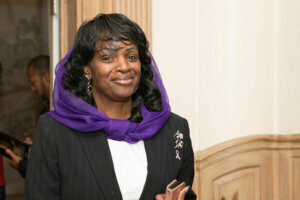On Valentine’s Day, the former wife of Beltway sniper John Allen Muhammad shared her story of domestic abuse in one of the communities where Muhammad and partner Lee Boyd Malvo killed 10 strangers in 2002.
Mildred Muhammad said she hopes recounting her story will prevent future tragedies.
She was the featured speaker in a Prince George’s County community center event called “Love Shouldn’t Hurt: A Celebration for Survivors of Domestic Violence,” hosted by Council member Jolene Ivey, D-District 5, and the county’s Family Justice Center.
John Allen Muhammad and Malvo terrorized the D.C. area for three weeks in October 2002, in which 10 people were killed and three others injured.

Mildred Muhammad and her children were taken into protective custody until her husband and Malvo were caught.
“Law enforcement informed me I was the intended target,” Mildred Muhammad said. “The theory was he was targeting innocent people to cover up my murder, so that he could come in as the grieving father and get custody of our children.”
After John Allen Muhammad and Malvo were caught, and law enforcement revealed she was the intended target, Mildred Muhammad said she was blamed, despite being a victim of domestic violence in her own relationship.
“I began getting the comments of, ‘If you would have stayed with him, he just would have killed you,’ and, ‘How dare you bring this drama into this quiet community?'” she said.
Prince George’s County and other communities now have procedures in place to help victims of domestic violence get themselves out of dangerous relationships, said Ivey, the council member who hosted the event. The county’s justice center even provides a place for a victim to testify, to avoid having to confront an abuser in court.
Ivey and Mildred Muhammad said a major goal is for abuse victims to know they are not alone.
“Eighty percent of victims do not have physical scars to prove that they are victims,” said Mildred Muhammad. “I am in that 80%.”
She offered advice to women in abusive relationships: “Document, document, document — date and time, and if you had others there to witness. What we have to do is build our case, in order to show law enforcement that it’s a pattern of abuse.”








